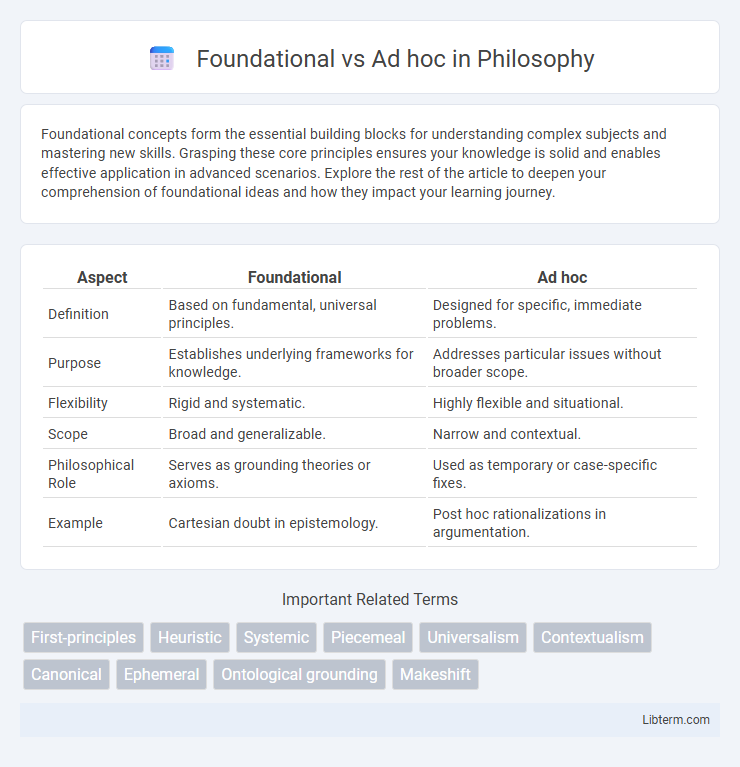Foundational concepts form the essential building blocks for understanding complex subjects and mastering new skills. Grasping these core principles ensures your knowledge is solid and enables effective application in advanced scenarios. Explore the rest of the article to deepen your comprehension of foundational ideas and how they impact your learning journey.
Table of Comparison
| Aspect | Foundational | Ad hoc |
|---|---|---|
| Definition | Based on fundamental, universal principles. | Designed for specific, immediate problems. |
| Purpose | Establishes underlying frameworks for knowledge. | Addresses particular issues without broader scope. |
| Flexibility | Rigid and systematic. | Highly flexible and situational. |
| Scope | Broad and generalizable. | Narrow and contextual. |
| Philosophical Role | Serves as grounding theories or axioms. | Used as temporary or case-specific fixes. |
| Example | Cartesian doubt in epistemology. | Post hoc rationalizations in argumentation. |
Understanding Foundational vs Ad Hoc Approaches
Foundational approaches establish structured frameworks and standardized processes that ensure consistency, scalability, and long-term sustainability in project management or organizational strategy. Ad hoc approaches prioritize flexibility and immediate problem-solving, often tailored to specific, short-term needs without a predefined system. Understanding the balance between these methods enables effective decision-making by leveraging foundational stability while maintaining the agility to address unique challenges dynamically.
Defining Foundational Systems
Foundational systems are critical, stable platforms that provide consistent infrastructure and core services essential for an organization's operations, ensuring scalability, security, and interoperability. These systems are designed for long-term use, offering standardized processes and robust architecture that support multiple applications and business functions. In contrast to ad hoc systems, foundational systems emphasize reliability and integration, serving as the backbone for enterprise-wide technology strategies.
What Makes a Solution Ad Hoc?
An ad hoc solution is characterized by its spontaneous, one-time use designed to resolve a specific problem without consideration for scalability or long-term application. It lacks structured planning, often built with limited resources and customized steps tailored to immediate needs rather than standardized processes. The absence of integration, documentation, and reuse potential distinguishes ad hoc solutions from foundational, systematic approaches.
Key Differences Between Foundational and Ad Hoc Methods
Foundational methods rely on structured, systematic approaches built on established principles and repeatable processes, whereas ad hoc methods are spontaneous, flexible, and tailored for specific, often immediate needs. Foundational techniques emphasize consistency, scalability, and long-term applicability, while ad hoc approaches prioritize quick problem-solving and adaptability without the need for predefined frameworks. The primary distinction lies in foundational methods' reliance on formalized systems versus ad hoc methods' reliance on situational, context-driven decisions.
Benefits of Foundational Approaches
Foundational approaches provide consistent, scalable frameworks that enhance long-term efficiency and reliability in systems development. These methods facilitate robust data integration, improve interoperability, and support comprehensive analytics by establishing standardized processes and structures. Organizations leveraging foundational approaches benefit from reduced complexity, lower maintenance costs, and enhanced ability to adapt to evolving technological landscapes.
Drawbacks of Relying on Ad Hoc Solutions
Ad hoc solutions often lack scalability and consistency, leading to fragmented processes that hinder long-term growth and integration. Their reactive nature can cause increased technical debt and maintenance challenges over time. Organizations relying heavily on ad hoc approaches face difficulties in standardizing workflows and ensuring reliable performance across varying environments.
When to Use Foundational vs Ad Hoc Strategies
Foundational strategies are essential when building long-term capabilities, ensuring consistency, and establishing scalable frameworks that support ongoing growth and stability. Ad hoc strategies are best utilized for addressing immediate, specific challenges or opportunities that require quick, flexible responses without the need for overarching structure. Selecting between foundational and ad hoc depends on organizational goals, the urgency of the issue, and the desired impact duration.
Impact on Long-Term Scalability and Maintenance
Foundational approaches prioritize building scalable architectures from the outset, ensuring systems can evolve with minimal rework and reduced technical debt over time. Ad hoc solutions often address immediate needs but create fragmented codebases that hinder long-term maintainability and scalability. Emphasizing modular design, consistent standards, and thorough documentation in foundational development significantly enhances system longevity and adaptability.
Case Studies: Foundational and Ad Hoc in Practice
Foundational case studies emphasize the development of core theories and frameworks, providing a structured approach to understanding complex phenomena. Ad hoc case studies focus on specific, situational problems, offering practical insights tailored to immediate challenges. Both types deliver valuable perspectives, with foundational studies supporting long-term academic research and ad hoc studies driving real-time decision-making in business and policy contexts.
Best Practices for Choosing the Right Approach
Choosing between Foundational and Ad hoc approaches hinges on organizational goals and project scope, with Foundational methods emphasizing standardized, scalable frameworks that ensure consistency and long-term value. Ad hoc strategies offer flexibility and speed, ideal for experimental or short-term initiatives where tailored solutions address immediate needs without extensive upfront investment. Best practices involve evaluating resource availability, desired repeatability, and risk tolerance to align the chosen approach with strategic objectives and operational constraints.
Foundational Infographic

 libterm.com
libterm.com